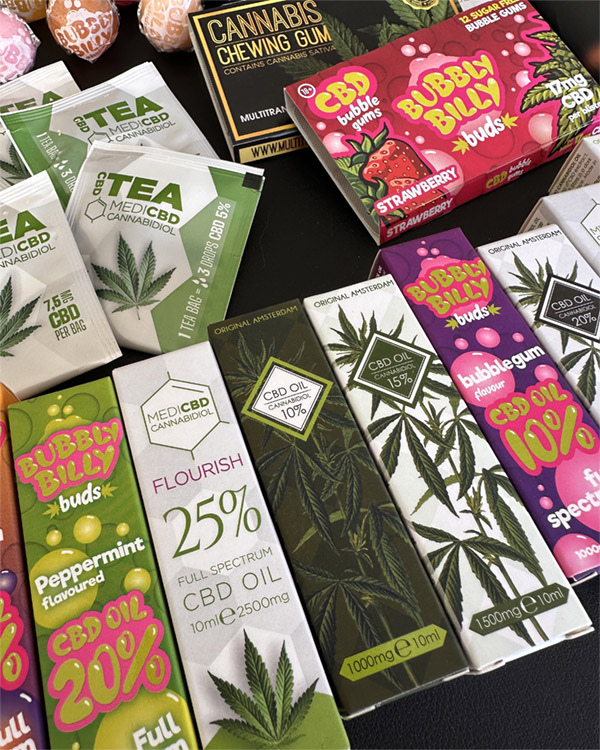
What is CBD? – All You Need to Know About Cannabidiol
- Teodora
- No Comments
CBD (with the full medical name of Cannabidiol) is a natural compound found in the cannabis plant. Unlike THC (tetrahydrocannabinol), it does not cause a “high.” It is mostly derived from hemp, a type of cannabis with very low THC levels. While research is still ongoing, studies suggest it might have several benefits for both medical and general health purposes (Harvard Health, 2018).
CBD is one of over 100 cannabinoids found in the cannabis plant. Its chemical formula is C21H30O2. Cannabidiol works with the body’s endocannabinoid system, which helps control mood, pain, sleep, and immune responses (Mayo Clinic, 2021). Unlike THC, CBD does not directly attach to CB1 and CB2 receptors in the brain, which is why it does not cause intoxicating effects.
CBD was first isolated in 1940 by Dr. Roger Adams at the University of Illinois. In the 1960s, Dr. Raphael Mechoulam, an Israeli scientist, identified and synthesized both Cannabidiol and THC, leading to modern Cannabis research.
What is CBD Used For?
CBD has been studied for its potential role in health and wellness. While research is ongoing, studies suggest Cannabidiol might help with:
- Anxiety and Stress Relief – It interacts with serotonin receptors, promoting relaxation.
- Pain and Inflammation Management – Often used for chronic pain and inflammatory conditions.
- Sleep Support – It might help regulate sleep cycles and reduce insomnia symptoms.
- Epilepsy – The FDA-approved drug Epidiolex helps patients with severe seizures.
- Neurological Conditions – Research shows Cannabidiol may provide neuroprotective effects for conditions like Parkinson’s and Alzheimer’s.
- Skin Conditions – Its anti-inflammatory properties may help with acne and psoriasis.
- General Well-being – Many people use CBD daily for overall balance and relaxation.
- Muscle Recovery – Some athletes use it for post-exercise soreness.
- Digestive Health – Some studies suggest Cannabidiol might help with IBS and gut health.
Popular CBD products include oils, gummies, lollipops, capsules, and topical balms. Cannabidiol-infused foods and drinks, such as chocolates, teas, and edibles, are also widely available
What are the Effects of CBD?
CBD Effects on the Brain
- Cannabidiol interacts with neurotransmitter receptors, which may help with anxiety, stress, and mood regulation.
- Some studies suggest it might improve cognitive function and protect the brain from damage.
CBD Effects on the Body
- It is often used for pain relief, especially for chronic pain conditions.
- It might improve sleep by promoting relaxation.
- Some users say Cannabidiol helps with digestion and gut health.
Can CBD Make You High?
Unlike THC, cannabidiol does not produce a ‘high.’ Many users report feeling relaxed, but it does not impair mental clarity (FDA, 2021).
Mental and Emotional Effects
- Many users report feeling calmer and less stressed after using Cannabidiol.
- Some say it helps with focus and mental clarity.
Physical Sensations
- Some people experience mild warmth or relaxation in the body.
- Those using it for pain may feel gradual relief.
- Cannabidiol might improve sleep, helping users wake up refreshed.
How is CBD Different from Marijuana?
Both Cannabidiol and marijuana come from the cannabis plant, but they are different. Marijuana has high THC levels, which cause a “high.” CBD, however, is mostly derived from hemp, which has very little THC and does not cause intoxicating effects. These products are often used for health and medical reasons, while marijuana is mainly for recreational use.
Is CBD Considered a Drug?
What Does the FDA Say About Cannabidiol? The FDA has approved the substance for specific medical conditions, such as epilepsy (Epidiolex) (FDA, 2021).
Is CBD Legal?
- United States – Cannabidiol derived from hemp is federally legal, but state laws may differ.
- European Union – This depends on the form the cannabidiol comes in. CBD cosmetics are mostly allowed in every country, but CBD in food is considered a novel food and not allowed to be sold. Please check with your local authorities whether you can sell CBD food and drinks products before purchasing them.
- Other Regions – Laws vary per region, please check the local authorities before using or selling it (EU Regulations).
Is CBD Safe?
Most studies suggest Cannabidiol is generally safe when used correctly. However, consumers should buy high-quality products to avoid impurities or inconsistent doses. CBD can also interact with some medications, so it’s best to consult a doctor before use.
Conclusion
CBD is a versatile compound that has gained popularity for its potential therapeutic effects. While more research is needed to fully understand its benefits, many users report positive experiences in areas such as stress relief, pain management, and sleep support. As the Cannabidiol industry continues to expand, choosing high-quality products from reputable sources is essential. If you’re considering trying CBD, look for reputable brands that provide lab-tested, high-quality products. Always check local regulations before purchasing.
